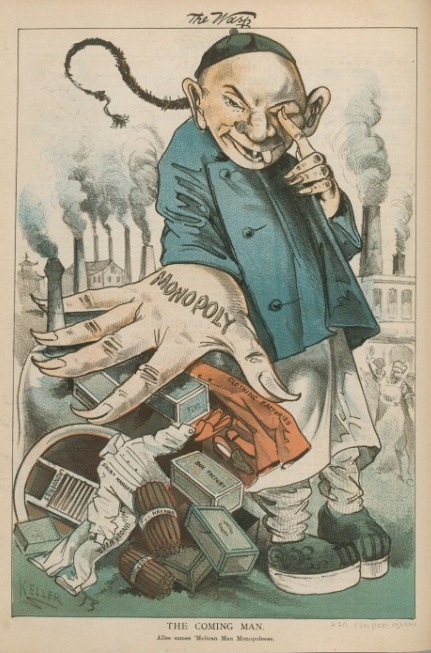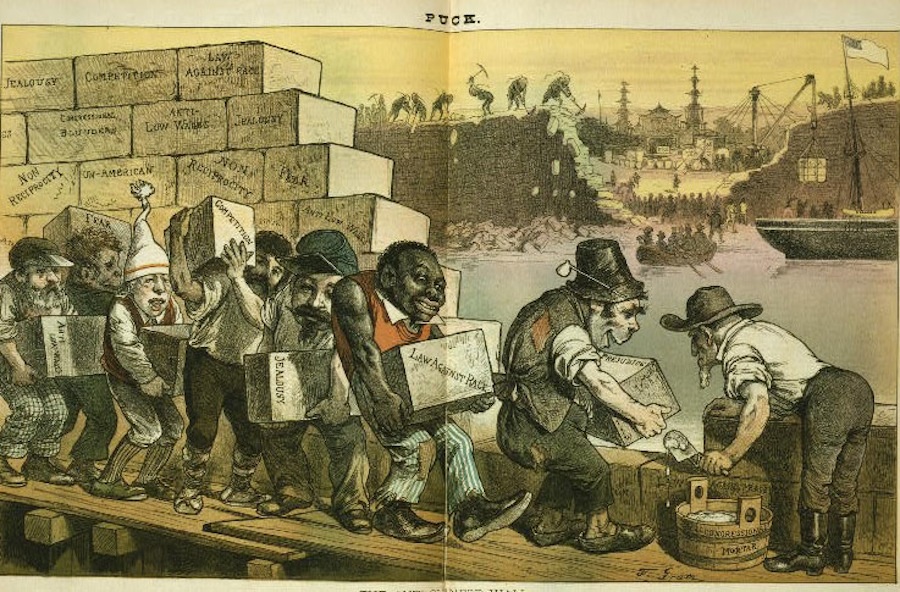Китайцы предупредили Трампа.
Jan. 6th, 2017 12:08 pm
За месяц до выборов американского президента написал о том, что "эффект Трампа" ни в коем случае не стоит недооценивать - поддерживающие его силы всегда были, есть и будут.
"Трампизм". У меня есть стойкое ощущение, что Дональд Трамп не станет следующим американским президентом, но при этом "эффект Трампа" не нужно недооценивать. Дело в том, что Трамп стал своего рода символом изоляционизма и протекционизма, обличителем процесса аутсорсинга в страны с низкой стоимостью рабочей силы, жадных банкиров и нелегальных мигрантов из Китая и Мексики (читай - вообще всех). Было бы неправильно предположить, что на арене появился "очередной клоун" и пытается сыграть свою партия - те силы, которые он разбудил (или канализировал) поднимают голову по всему миру - все в большем количестве стран раздаются призывы к ограничению свободной торговли, возведению торговых барьеров и контролем за перемещением граждан (один Brexit чего стОит). Рано или поздно это приведет к тому, что власти будут вынуждены "прислушаться к общественному мнению" и в итоге это выльется в пОвышенные зарплаты, "защищенные" рабочие места и повышение цен на продукцию (за счет усложнения торговых процедур)
Новоизбранный президент не успел принести присягу, но уже "насрал в карман" ближайшему соседу - Мексике, добившись (или согласовав) отмену планов по расширению производства со стороны американской компании Ford.
Популистские призывы о создании рабочих мест - это, конечно, хорошо, но в реальной жизни речь идет не столько о рабочих местах, сколько о наличии у Мексики большого количества соглашений о беспошлинной торговле с другими странами (в активе Мексики числиться 44 таких соглашения, в то время, как у США - только 22).
По причине большого количества торговых соглашений Мексику облюбовали мировые автопроизводители (они получают здесь доступ к дешевым запчастям и комплектующим из других стран, и получают хорошую экспортную площадку на рынки сбыта).
Вот список автопроизводителей, разместивших производство в Мексике:
Фиат - 1,570 рабочих мест
Ниссан - 3,000 рабочих мест
Инфинити - 5,700 рабочих мест
Мазда - 3,000 рабочих мест
Дженерал Моторс - 700 рабочих мест + 5,600 рабочих мест
Форд - 2,800 рабочих мест
Киа - 4,000 рабочих мест
БМВ - 1,500 рабочих мест
Хонда - 3,200 рабочих мест
Тойота - 2,000 рабочих мест
Но "страсти по Мексике" - это еще только цветочки, особенно по сравнению с "азиатской стратегией" Трампа. Дело в том, что новый американский президент пригласил в свою команду людей, которые занимают жесткую анти-китайскую позицию, и этот факт очень напрягает Поднебесную. Речь идет о двух персонажах, которые уже давно критикуют Китай за "нечестные приемы" в торговле, и сейчас эти люди получают карт-бланш на выяснение отношений с китайскими представителями.
Вот лишь краткая подборка материалов на тему ссоры Ивана Ивановича с Иваном Никифоровичем (часть материалов взята из китайских источников):
Трампа критикуют за выбор торгового представителя - Trump Taps China Critic Lighthizer for U.S. Trade Representative
Lighthizer has previously accused China of unfair trade practices, in line with views held by Peter Navarro, a China critic who Trump last month named to head a newly formed White House National Trade Council. In a 2011 article published in the Washington Times, Lighthizer said that using tariffs to promote American industry was a Republican tenet harking back to pro-business politicians who established the party.
“The icon of modern conservatism, Ronald Reagan, imposed quotas on imported steel, protected Harley-Davidson from Japanese competition, restrained import of semiconductors and automobiles, and took myriad similar steps to keep American industry strong,” Lighthizer wrote. “How does allowing China to constantly rig trade in its favor advance the core conservative goal of making markets more efficient? Markets do not run better when manufacturing shifts to China largely because of the actions of its government.”
В редакционной статье China Daily высказывается опасение из-за выбора экономиста Питера Наварро (Peter Navarro) в качестве экономического советника Трампа - Alarm bell ringing due to Trump's new pick on trade
Because it is so emotionally charged, populism can be easily guided for a purpose. One example of this is the campaign rhetoric of Donald Trump about how foreigners have "raped" the United States by "stealing" many of its manufacturing jobs.
At the time, many Chinese were willing to laugh away such accusations against China as just more of the usual rhetoric-though more extreme-that has come to characterize presidential elections in the US. Now, however, there is real cause for concern as the president-elect has named economist Peter Navarro, known for his anti-China alarmism, as his trade adviser.
Редакционная статья China Daily указывает на опасность выбора "неправильного экономического советника, проводящего анти-китайскую политику" (попутно обвиняя последнего в том, что тот "глух и слеп" и сравнивая его высказывания с "нацисткой пропагандой") - Navarro another blow to US-China ties
Back in August 2012, I had criticized a documentary based on the 2011 book Death By China: Confronting the Dragon - A Global Call to Action by Navarro and Greg Autry, calling it "hate speech against China". I described his key points: China is bad in every respect. China is stealing American jobs, killing its babies with unsafe toys and its army is preparing to kill Americans. In a country known for making great movies, I wrote at the time, a trash production called Death By China which reminded one of Nazi propaganda should not make it to even the screen.
The China bashing by the conservative professor at University of California-Irvine, also includes his other books, such as The Coming China Wars (2008) and Crouching Tiger: What China's Militarism Means for the World (2015).
People who read the reviews on amazon.com will find that The Coming China Wars is "China bashing at its worst" and "meant to terrify you" and "simplistic and exaggerating". The Crouching Tiger also portrays China as a military threat to the US in a biased and sensational way.
In other words, Navarro is hardly a visionary. He is deaf and blind to the enormous win-win cooperation and potential of China-US relations, whether in trade and investment or in tackling regional and global challenges.
Китайское издание Global Times прямо указывает на возможное развитие американо-китайского конфликта, как результата действий нового экономического советника - Trump’s Navarro nomination may raise risk of Sino-US conflict (статью приходиться приводить полностью - очень высока концентрация беспокойства)
US President-elect Donald Trump appointed China hawk Peter Navarro as head of the new National Trade Council Wednesday. Navarro's public image is largely shaped by his three books about China: The Coming China Wars, Death by China, and Crouching Tiger: What China's Militarism Means for the World. An article in The New Yorker once said Navarro's views on trade and China were so radical that it's impossible to "find another economist who fully agrees with them."
Trump's Navarro pick is regarded as a signal that he will take more aggressive actions to promote his American interests first agenda. It's likely that the US will adopt reckless trade protectionist policies in future, causing changes to the pattern of the benefits distribution between the US and other countries.
Navarro advocated enhancing US protection of Taiwan. He also invited a Chinese dissident exiled in the US to write a preface for his book. Many Chinese people would regard him as an anti-China scholar. Will such a person leading the National Trade Council reinforce Trump's prejudice against China and trigger more frictions in bilateral trade and even the overall relationship?
Trump chose Navarro not necessarily because of his anti-China stance. The president-elect's primary goal is to revive the US economy. He mistakenly attributes the US economic downturn and manufacturing job losses to globalization and he believes China's prosperity was stolen from the US. He will target all economies, including US allies.
It appears that the Trump team is anxious to achieve quick success and get instant benefits. The president-elect doesn't want strategic confrontation, nor does he have a high interest in ideological struggle. He only cares about interests. These will affect how China and the US will deal with each other as well as the appearance of future frictions.
China is powerful enough to withstand pressures from the Trump government. Beijing will get used to the tensions between the two countries. If Washington dares to provoke China over its core interests, Beijing won't fear setting up a showdown with the US, pressuring the latter to pay respect to China.
Despite ceaseless frictions, China must figure out what we are vying for with the US. Economic growth and social solidarity are the two determining factors for Sino-US competition. Trump flew the flag of reviving the US' manufacturing sector as soon as he won the election, reminding us that this is the basis for prosperity. China's achievements in the past should be attributed to the substantial development of the manufacturing sector, and the country cannot lose momentum in the future.
It is more important to address China's internal problems, especially its economic maladies, than to worry about Navarro's appointment. As long as China can maintain a robust economy and the Chinese are confident, China doesn't fear any challenges from outside. Longstanding issues such as the Taiwan question and the South China Sea disputes will be finally resolved when China's national strength is powerful enough.
Trump and his cabinet do not have more resources than his predecessors to drive his ambitions into actions. He will go back to the current world trade rules unless he wants to upend the hard-earned post-WWII order.
The US can no longer push China around today. We believe that the US political system is self-correctable, and won't tolerate a foreign policy that might put the world order in chaos and the Americans' interests in danger. Reversing globalization will never prevail.
Судя по всему, завтра может случиться очень серьезная драка, после которой о Мексике даже и не вспомнят.


